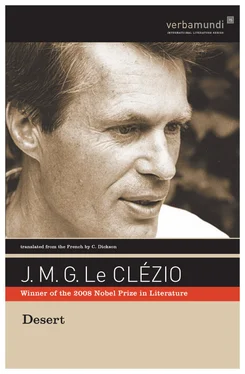Most of those who were arriving now were old people, women and children, exhausted from their forced march through the desert, clothing torn, feet bare or tied with rags. Their faces were black, burnt with the light, eyes like two pieces of coal. The young children went naked, wounds marking their legs, bellies bloated with hunger and thirst.
Nour wandered through the camp, weaving his way through the tents. He was astonished to see so many people, and at the same time he felt a sort of anxiety because, without really knowing why, he thought that many of those men, those women, those children would soon die.
He was constantly running into new travelers walking slowly down the aisles between the tents. Some of them, black like the Sudanese, came from farther south and spoke a language that Nour didn’t understand. Most of the men’s faces were hidden, wrapped in woolen cloaks and blue cloth; their feet were shod with sandals made of goat leather. They carried long, flintlock rifles with copper barrels, spears, daggers. Nour stepped aside to let them pass, and he watched them walk toward the gate to Smara. They were going to greet the great sheik, Moulay Ahmed ben Mohammed al-Fadel, who was called Ma al-Aïnine, Water of the Eyes.
They all went and sat down on the small benches of dried mud that circled the courtyard in front of the sheik’s house. Then they went to say their prayer at sunset to the east of the well, kneeling in the sand, turning their bodies in the direction of the desert.
When night had come, Nour went back toward his father’s tent and sat down beside his older brother. On the right side of the tent his mother and sisters were talking, stretched out on the carpets between the provisions and the camel’s packsaddle. Little by little, Smara and the valley fell silent again; the sounds of human voices and animal cries faded out one after the other. The magnificently round white disk of the full moon appeared in the black sky. Despite all the heat of day accumulated in the sand, the night was cold. A few bats flew across the moon, dove suddenly toward the ground. Nour, lying on his side with his head resting against his arm, was watching them as he was waiting to doze off. He fell abruptly to sleep, without realizing it, eyes wide open.
When he awoke he had the odd impression that time had stood still. He looked around for the disk of the moon and upon seeing that it had begun its descent to the west, he realized he had slept for a long time.
The silence hanging over the campsites was oppressive. All that could be heard was the distant howling of wild dogs somewhere out on the edge of the desert.
Nour got up and saw that his father and brother were no longer in the tent. He could only make out the vague shapes of the women and children rolled up in the carpets on the left side of the tent. Nour started walking along the sandy path between the campsites toward the ramparts of Smara. The moonlit sand was very white against the blue shadows of stones and bushes. There was not a single sound, as if all the men were asleep, but Nour knew that the men weren’t in the tents. Only the children were sleeping, and the women were lying very still, rolled up in their cloaks and carpets, looking out of the tents. The night air made the young boy shiver, and the sand was cold and hard under his bare feet.
When he neared the city walls, Nour could hear the murmuring of men’s voices. A little farther on, he saw the motionless shape of a guard squatting in front of the gate to the city, his long rifle propped against his knees. But Nour knew of a place where the mud rampart had collapsed, and he was able to enter Smara without going past the sentinel.
He immediately discovered the men assembled in the courtyard of the sheik’s house. They were sitting in groups of five or six on the ground around braziers where large copper kettles held water for making green tea. Nour slipped silently into the gathering. No one looked at him. All the men were watching a group of warriors standing in front of the door to the house. There were a few soldiers from the desert, dressed in blue, standing absolutely still, staring at an old man dressed in a simple cloak of white wool that was pulled up over his head, and two armed young men who took turns speaking out vehemently.
From where Nour was seated, it was impossible to understand their words, due to the sounds of the men who were repeating or commenting on what had already been said. When his eyes had adjusted to the contrast of the darkness and the red glow of the braziers, Nour recognized the figure of the old man. It was the great sheik Ma al-Aïnine, the man he’d already caught a glimpse of when his father and older brother came to pay their respects after their arrival at the well in Smara.
Nour asked the man next to him who the young men beside the sheik were. He was told their names: “Saadbou and Larhdaf, the brothers of Ahmed al-Dehiba, he who is called Particle of Gold, he who will soon be our true king.”
Nour didn’t try to hear the words of the two young warriors. All of his attention was focused on the frail form of the old man standing motionless between them, with the moon lighting his cloak and making a very white patch.
All the men were looking at him too, as if with the same set of eyes, as if he were the one really speaking, as if he would make a single gesture and everything would suddenly be transformed, for the very order of the desert emanated from him.
Ma al-Aïnine did not move. He didn’t seem to hear the words of his sons, or the endless murmur coming from the hundreds of men sitting in the courtyard before him. At times he would cock his head slightly, look out over the men and the mud walls of his city toward the dark sky, in the direction of the rocky hills.
Nour thought that perhaps he simply wanted the men to return to the desert, from where they had come, and his heart sank. He didn’t understand the words of all the men around him. Above Smara the sky was unfathomable, frozen, its stars dimmed in the white haze of moonlight. And it was a bit like a sign of death, or abandonment, like a sign of the terrible absence that was hollowing out the tents that stood so still near the city walls. Nour felt this even more strongly when he looked at the fragile shape of the great sheik, it was as if he were entering into the very heart of the old man, entering his silence.
Other sheiks, chieftains of great tents, and Tuareg warriors came to join the group one after another. They all spoke the same words, their voices cracking from fatigue and from thirst. They spoke of the soldiers of the Christians who made incursions into the southern oases bringing war to the nomads; they spoke of fortified towns the Christians were building in the desert barring access to wells all the way to the seashore. They spoke of lost battles, of the men who had died, so many of them that their names could no longer be remembered, of swarms of women and children fleeing northward through the desert, of the carcasses of dead livestock strewn everywhere along the way. They spoke of caravans that were cut short when the soldiers of the Christians liberated the slaves and sent them back to the south, and how the Tuareg warriors received money from the Christians for each slave they had stolen from the convoys. They spoke of merchandise and livestock being seized, of bands of brigands that had forayed into the desert along with the Christians. They spoke also of troops of soldiers marching for the Christians, guided by the black men from the south, so numerous that they covered the sand dunes from one end of the horizon to the other. And the horsemen who encircled the camps and killed anyone who resisted them on the spot, and then took the children away to put them into Christian schools in the forts on the coast. So when the other men heard this, they said it was true, by God, and the clamor of voices swelled up and heaved in the square like the sound of a rising wind.
Читать дальше












